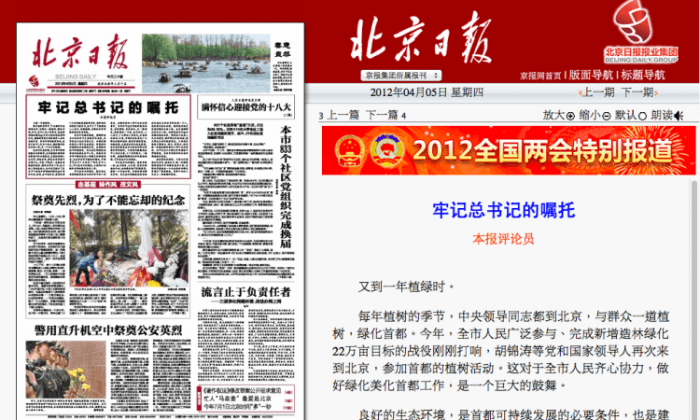China’s local governments will have to repay 4.6 trillion yuan (approximately US$720 billion) in debt in the next two years, according to recent reports.
But the exact amount of debt is sometimes mixed up. China Securities Journal on Aug. 16 said that China’s National Audit Office published a report on local governments debts amounting to 10.7 trillion yuan (approximately US$1.67 trillion), by the end of 2010.
However, a Moody’s report released in July showed that the total local government debts were 14 trillion yuan (approximately US$2.19 trillion), significantly exceeding the figure released by China’s Audit Office.
Moody’s attributed the nearly $540 billion gap between the two to the way the debts were calculated; the Chinese auditor’s report excluded some bank-funded loans.
The discrepancy in figures has led to discussions among investors and analysts about how China’s local government debt may be underestimated; if loan defaults take place en masse the banking system may be crippled.
During the 2008 financial crisis the regime launched a 4 trillion yuan fiscal stimulus package, which generated about half of the debt.
Peter Elston, a strategist with Aberdeen Asset Management Asia, said the episode served as a reminder that Chinese banks can be used as instruments of the state, making them less attractive as investment options.
“It is very sad because it is going to take a very long time for them to convince investors that they are run for the benefit of shareholders and not for the benefit of the broader economy,” Elston told Reuters in an interview in July.
A source told China Securities Journal that there were 22,300 loans of dubious nature in China’s banks last year, involving a total of 2.21 trillion yuan (approximately US$345.7 billion).
He said that in some cases contracts were broken when the loans were due.
Liu Yuhui, the director of Laboratory for Finance of the Finance Institute in Chinese Academy of Social Sciences, told the People’s Daily overseas edition, “From the survey of the Audit Office, the debts having to be repaid in recent two years are close to 5 trillion yuan. It is a large sum considering the local governments’ yearly revenue.”
Liu said that only 26 percent of the local debt was used to invest in projects that earn an income. The rest are for public or semi-public welfare, which does not produce any income. So this makes the repayment of huge debts relatively hard.
Chen Donghai of CES Capital International Co., Ltd. wrote an article pointing out that in the early 1990s there were a 1.4 trillion yuan of defaults in Chinese banks. The problem was “resolved” by removing non-performing loans from major banks and transferring them to four asset management companies (AMCs).
Professor Frank Xie, business professor at the University of South Carolina, said that the debts are actually a burden on the Chinese people.
Xie said, “There is one way to repay local governments’ debts. It is from the tax system, readjusting the distribution of tax income between the central and the local, so that the local can have sufficient money to work. However, will the central government do it? Will the vested interest groups agree with it?”
“Now that China’s local government debt problems have caused much panic in the market, the situation is not optimistic,” Liu Xianyun, a well-known e-commerce industry leader in China, said in an article on International Finance News on Aug. 5.
Liu said, “In a sense, the root of China’s local debt crisis is not on the debt itself, but some degree is on the credibility of the local governments. The distrust to the local governments affects the market and the behavior of the government-led market is looked on with suspicion.”
As for the reasons why China’s local governments owe so much debt, Xie thinks that China’s local debts are caused by systemic problems. “When the local governments get money, they never seriously think of repaying it. So they are sloppy in managing their debt.”
He said that China’s huge local debt problem has a lot to do with the personal concerns of local officials. “First, doing a project can enhance their performance; meanwhile, they can get bribes in the bidding process. Next, they can leave the debt to be repaid to the next term official. There is no commitment towards repaying the debt.”
Read the original Chinese article
[email protected]
But the exact amount of debt is sometimes mixed up. China Securities Journal on Aug. 16 said that China’s National Audit Office published a report on local governments debts amounting to 10.7 trillion yuan (approximately US$1.67 trillion), by the end of 2010.
However, a Moody’s report released in July showed that the total local government debts were 14 trillion yuan (approximately US$2.19 trillion), significantly exceeding the figure released by China’s Audit Office.
Moody’s attributed the nearly $540 billion gap between the two to the way the debts were calculated; the Chinese auditor’s report excluded some bank-funded loans.
The discrepancy in figures has led to discussions among investors and analysts about how China’s local government debt may be underestimated; if loan defaults take place en masse the banking system may be crippled.
During the 2008 financial crisis the regime launched a 4 trillion yuan fiscal stimulus package, which generated about half of the debt.
Peter Elston, a strategist with Aberdeen Asset Management Asia, said the episode served as a reminder that Chinese banks can be used as instruments of the state, making them less attractive as investment options.
“It is very sad because it is going to take a very long time for them to convince investors that they are run for the benefit of shareholders and not for the benefit of the broader economy,” Elston told Reuters in an interview in July.
A source told China Securities Journal that there were 22,300 loans of dubious nature in China’s banks last year, involving a total of 2.21 trillion yuan (approximately US$345.7 billion).
He said that in some cases contracts were broken when the loans were due.
Liu Yuhui, the director of Laboratory for Finance of the Finance Institute in Chinese Academy of Social Sciences, told the People’s Daily overseas edition, “From the survey of the Audit Office, the debts having to be repaid in recent two years are close to 5 trillion yuan. It is a large sum considering the local governments’ yearly revenue.”
Liu said that only 26 percent of the local debt was used to invest in projects that earn an income. The rest are for public or semi-public welfare, which does not produce any income. So this makes the repayment of huge debts relatively hard.
Chen Donghai of CES Capital International Co., Ltd. wrote an article pointing out that in the early 1990s there were a 1.4 trillion yuan of defaults in Chinese banks. The problem was “resolved” by removing non-performing loans from major banks and transferring them to four asset management companies (AMCs).
Professor Frank Xie, business professor at the University of South Carolina, said that the debts are actually a burden on the Chinese people.
Xie said, “There is one way to repay local governments’ debts. It is from the tax system, readjusting the distribution of tax income between the central and the local, so that the local can have sufficient money to work. However, will the central government do it? Will the vested interest groups agree with it?”
“Now that China’s local government debt problems have caused much panic in the market, the situation is not optimistic,” Liu Xianyun, a well-known e-commerce industry leader in China, said in an article on International Finance News on Aug. 5.
Liu said, “In a sense, the root of China’s local debt crisis is not on the debt itself, but some degree is on the credibility of the local governments. The distrust to the local governments affects the market and the behavior of the government-led market is looked on with suspicion.”
As for the reasons why China’s local governments owe so much debt, Xie thinks that China’s local debts are caused by systemic problems. “When the local governments get money, they never seriously think of repaying it. So they are sloppy in managing their debt.”
He said that China’s huge local debt problem has a lot to do with the personal concerns of local officials. “First, doing a project can enhance their performance; meanwhile, they can get bribes in the bidding process. Next, they can leave the debt to be repaid to the next term official. There is no commitment towards repaying the debt.”
Read the original Chinese article
[email protected]



